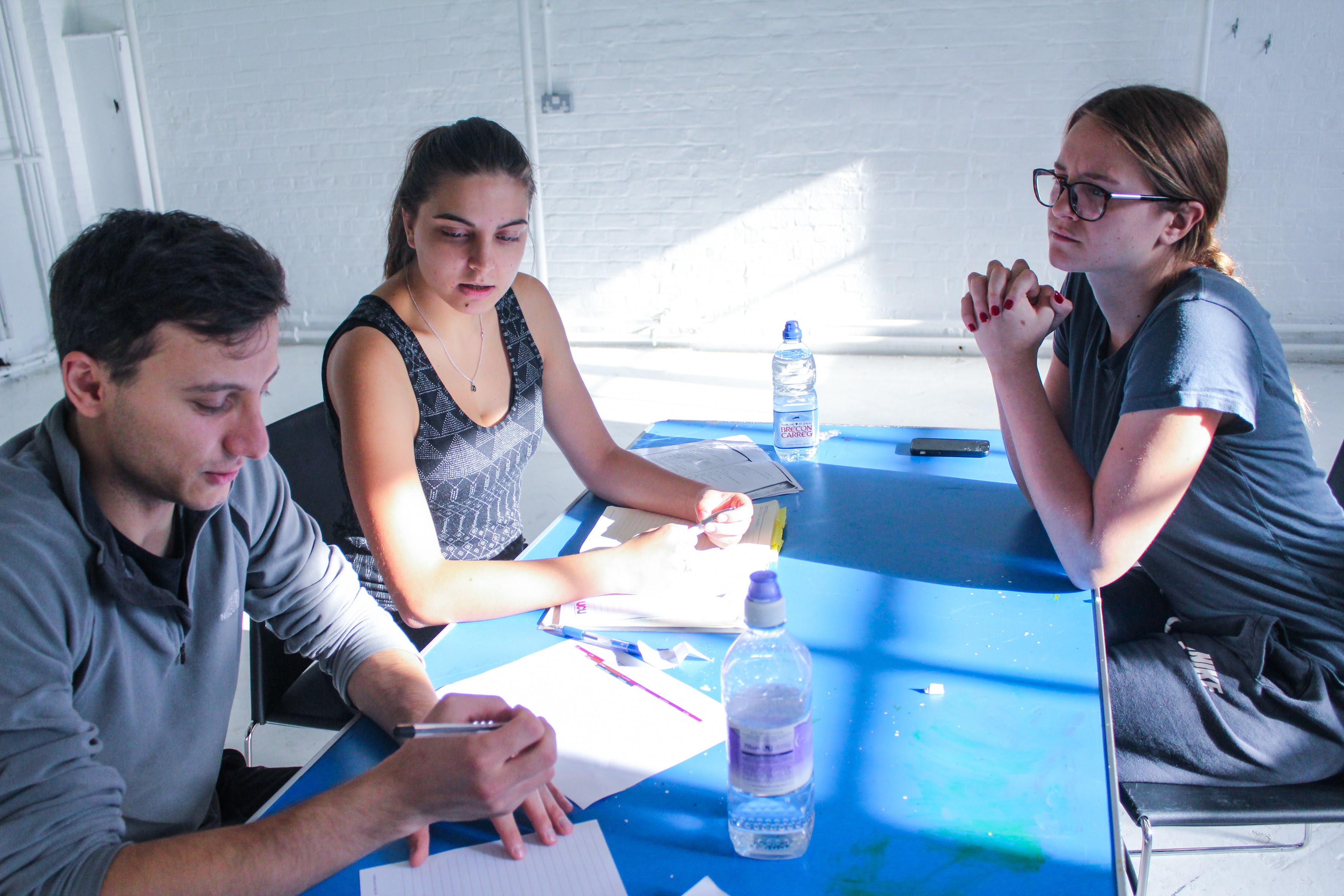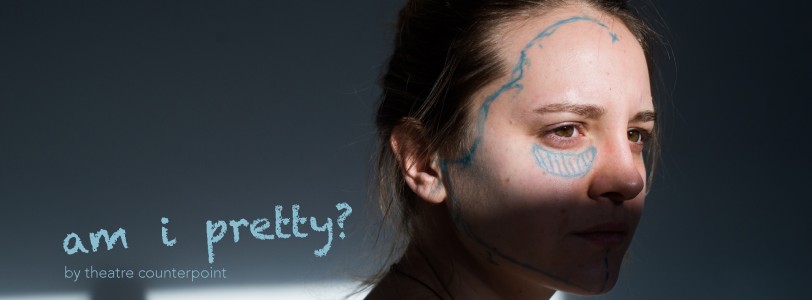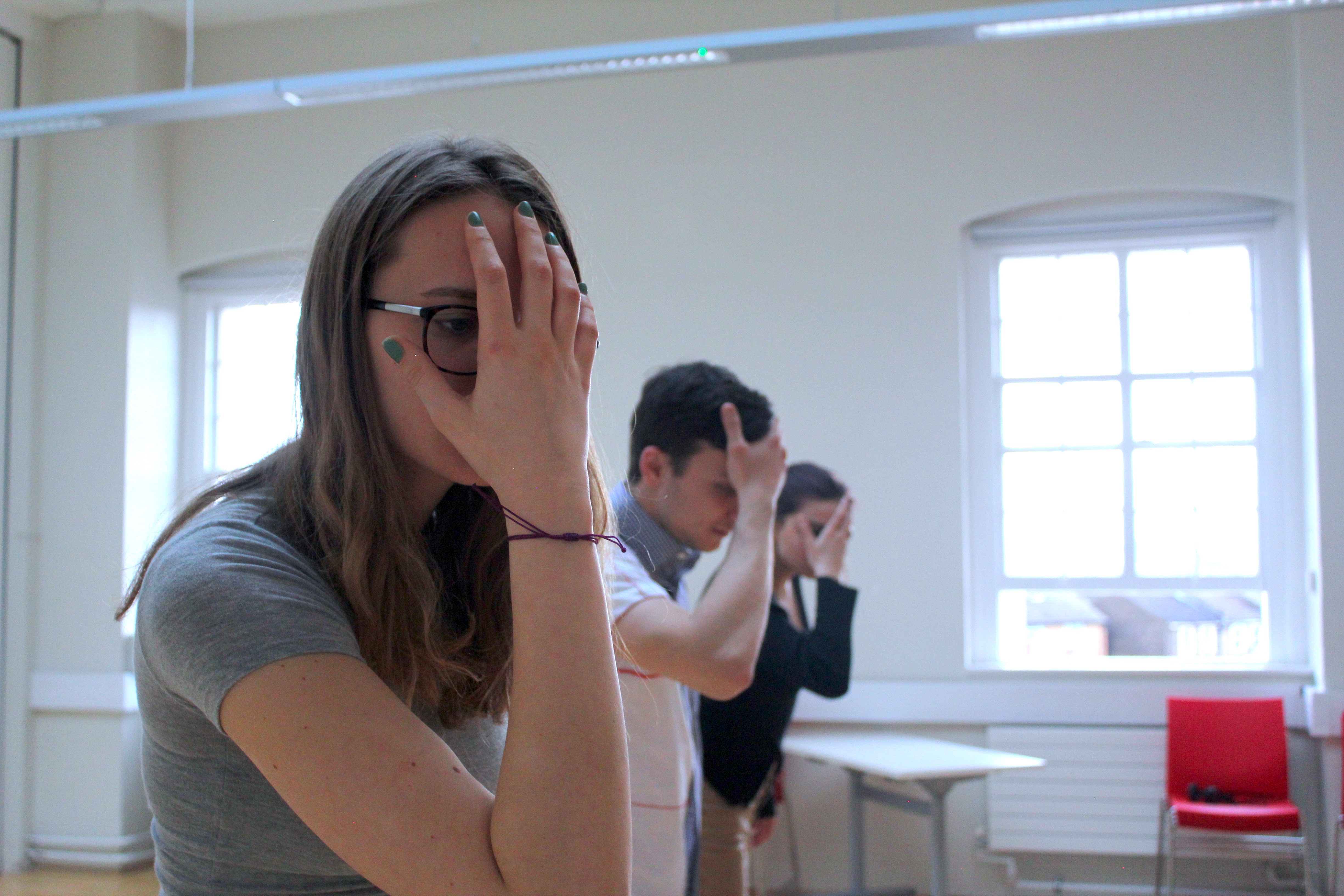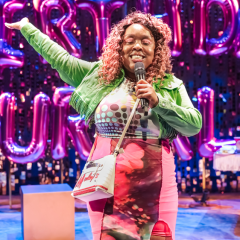Can you first introduce yourself to the reader?
Dadiow: I'm the director of this show. I have been working on the application of musical forms to compose devised performance for 3 years, and this is the second production we are staging in London off-west end venues.
Valentin: I joined the company for this project.
Mira: I'm one of the people behind our current show Am I Pretty?. I also worked with Dadiow on our previous performance Don't Turn the Lights On (which also used music and was presented at CPT, BAC and Bread and Roses Theatre.)
Tori: I am one of the performers and devisers. I joined Theatre Counterpoint last year.
You use music as a basis upon which to structure your performances. Where did that idea first come from?
Dadiow: I was very much influenced by the training at Central when I did my masters degree - the composition of devised theatre. I also noticed that in many forms, for example, opera and musical theatre, music and theatre are tightly connected. Additionally, many playwrights embed 'musicality' in their writing, for instance, Samuel Beckett whose instructions should be rigorously followed in order to deliver what he perceived as musicality on stage. Having these inspirations while exploring a method to compose devised theatre in which most material is nonlinear and fragmented, I came to this idea of using musical structure as a framework for the theatrical components to build upon. I think making work accessible is important; and I believe that music provides a different narrative for spectators to grasp that does not require the lead of texts in traditional plays.
Do you find it difficult to integrate musical disciplines into your work, which can very often tackle important social issues?
Mira: Yes! But in a good way. It's not easy to work on and develop this whole new methodology to making performance, to do something which nobody has done before, but it's also incredibly rewarding.
Valentin: It doesn't feel like the usual rehearsal room. And that's quite interesting. Sometimes the musical structure will easily compliment the theatrical form and sometimes it would be quite difficult to find how to transpose a certain part from the score into theatrical language. We have to be unconventional in our approach.
Dadiow: I don't try to connect the issues we're addressing in the show with the musical forms. We usually analyse the musical principles, and let it grow from what we have as a team. It's a bit like 'rhizome' in Deleuze and Guattari's term - it is one branch splits into two; it's comprised not of units but of dimensions, or rather directions in motion.
Your latest piece, Am I Pretty? tackles the growing trend of plastic surgery, and self-identity. What inspired you to make the piece?
Mira: It started as a joke, or what I thought was a joke really. We were in a cafe, thinking about what our next project's going to be and Dadiow said "I always wanted to have a chin". And I looked at her and said "well, you do Dadiow, you have a chin!" We kept talking about appearance, what it means to us, and to what extend it's linked to who we are. I also feel very personal about this subject because I was facing my own body image issues at the time.
Dadiow: I've always wanted to have a chin augmentation as I don't have a chin; I also I looked at myself in the mirror and imagined that if I had an extended chin, what would it feel like? Does it mean that I'll be carrying this thing that didn't come with me when I was born for the rest of my life? Who am I? Having these thoughts in mind made me curious about all the people who have had cosmetic surgeries and what it feels like for them before and afterwards. Do they change their perception of themselves? What psychological journey might a person go through when applying this operation to their bodies and faces? The work is to also ask these questions and share what we heard/read/experienced rather than to define what it good or bad.
Tori: It's such an interesting topic. Plastic surgery is so many things, has so many dimensions. Most people dismiss it as an unnecessary vanity but it is a scientific marvel, a form of self expression like tattoos and piercings, a complete life changer, in both good and bad ways. My perception of cosmetic surgery was completely changed from even just the first workshop we did. And I think this shift in attitude has to happen to more people. Because it is a growing, evolving phenomenon and people have to embrace the future, not turn their backs to it.
Am I Pretty? uses jazz as the skeleton. What made jazz particularly appropriate for a performance about self-image?
Mira: In our previous project, we used classical music to inform the structure of the piece,which was a great starting point because of its almost mathematical logic, it was easier to translate it into theatrical terms. We felt it's time for a challenge after Don't Turn the Lights On, so what better challenge than trying to translate jazz into theatre? Using jazz structure to talk about self-image is great because it allows us to create a nice non-hierarchical group dynamic, like a jazz band, and to talk about the subject in a relaxed way with the audience, to connect with them in the present moment through the improvisation.
Tori: The reasons are manifold really. It's foundations lie in self-expression. I realise all music and art is self-expression of a kind, but jazz was created from the need for self-expression. It used to be the only way that a whole community of people could express their emotions, successes, frustrations, identity. It is still considered one of the most expressive musical forms. Another aspect is the general structure, which allows for this self-expression to come through. The freedom to play what you feel, and know that the others will support you no matter what direction you go in. Hmmm, I wish true self-expression was received in this way.
To what extent do you believe social media influences our self-perception?
Mira: Social media is a big part of our lives, it's a way to communicate, to stay connected and to express ourselves, so it's no surprise it affects our self-perception - it's become one of the main means to perceive the world and our society.
Valentin: It influences us to a molecular level nowadays. We get a hit of dopamine every time we get a notification or our phone buzzes because someone has liked our photo, so there is an influence. Whether it's good or bad I think depends on the extent to which we're engaging with it. I mean, all those platforms give us the opportunity to express ourselves 'freely' and communicate easier than ever before but the extremes might be a bit worrying. You can have too much of a good thing, after all.
Dadiow: I'd argue that social media builds the standard in most things by providing and selecting what we as spectators should see. While there's 'standard', we are either within or without the standard. I'm sure some people don't bother if they're beyond the standard, or they might not even agree with it, however, there's still a great amount of people that feel insecure when they find themselves not fitting within the standard. When one feels insecure, their self-perception might be easily altered, and I think that's what social media does to us.
Would you say that you are anti-cosmetic surgery?
Tori: NO.
Mira: Definitely not against the idea of aesthetic surgery provided there's enough thought and examination prior to the surgery to ensure the person isn't trying to fix mental health issues through surgery, like body dysmorphia, and that they are operated on by a fully qualified professional.
Valentin: Depends on the case, really. Fundamentally, I'm not anti-anything. (I'd say I'm anti anything which originates from a bad place of conscience. )
Dadiow: Not at all. I wanted to have a surgery before we started working on the show! I think it's a personal choice, and I'm just interested in 'why' and 'how' it affects one's life.
What inspired you to get into theatre?
Tori: My favourite thing to do as a child was to go see puppet shows at the local theatre. It was aimed at kids so it always had some moral at the end, which taught me about not lying and being nice to people and so on. I loved the creativity and aesthetics of the convention but I also loved how much I learned those shows, and still do to this very day. Theatre is my way of better understanding myself and the world that I live in. And hopefully someday I can make people feel that as well.
Mira: It's something very enchanting about live performance, almost addictive: the timely magic of connecting to an audience in the present moment, the rapport. I can't really explain it, but it's just something I couldn't help get into.
Dadiow: I was making shows at schools since I was 10, and I was not aware it was so-called 'theatre'. I think I just naturally came to this world and started doing what I like - sharing, challenging, and questioning through a performative lens.
What has been your all-time favourite show to work on?
Dadiow: I loved the time when I directed Beckett's Endgame before I came to London. It was the first time I encountered 'musicality' in theatre - there's so much to 'listen to' in a performance, as much as what you can see. I liked solving puzzles created by Beckett and realising how profoundly his plays are connected to human existence.
Mira: This one. No, the next one! (laughs) Ah, I definitely don't have an all-time favourite, I don't think I'll ever be able to compare and pick the best from the different productions I've worked on.
Valentin: Every single show has its own energy and life so they're all unique experiences which I'm happy to have been part of.
With such a mix of nationalities in your collective, do you find it difficult sometimes to agree on the best way to present a societal issue, due to differing experiences?
Tori: If anything, it's very helpful. We do come from different parts of the world, which often have very different traditions. But this is great because we might disagree at first but then find a way to work it out and find common ground, which means everything is considered from different cultural perspectives and that creates very dynamic forms of expression.
Valentin: As artists, sharing the same society I don't think the nationality has anything to do with the difference in our creative voices.
Dadiow: Ha I think as long as it's a collaboration involving more than 2 people it's difficult. It's not so much to do with nationality I suppose. Each individual has his/her own background, value, and ways of thinking and working, however, I don't think it's necessary to find an agreement among the collectives. What's crucial in a devising process is to allow different voices to be heard and presented together as a team.
Mira: Well, we're different in many ways but I believe these difference feed into and enrich our creative work.
If you could work with anyone in the industry, who would it be?
Dadiow: I very much want to work with Eugenio Barba. His work is highly collaborative, and he could always resonate his work with the audience with spontaneous energy on stage. He explains his dramaturgical and compositional tools in all his publications, but they still seem mysterious to me. Barba is a real philosopher, and I think only by working with him I then get to understand a little bit of his methodology.
Tori: it is hard to pin point really. There are so many great practitioners making amazing work right now. Even just looking at my peers, knowing so many of them will go on to do great things as well.
You can travel back in time to 16-year- old you, what do you tell them?
Tori: I honestly don't think I have changed very much (laughs).
Valentin: I'm joining Tori on this one.
Mira: If I met 16-year-old me, I won't tell them anything because they wouldn't listen to it anyway (I was a very stubborn and rebellious teenager, bless my dad who had to put up through me then).
Dadiow: I'll probably say whatever you're doing just keep doing it. I like who I am and what I'm doing now and it's an accumulation from the past. It was good whatever it was.
What advice do you have to somebody who wants to get into theatre?
Dadiow: Always be curious about everything. Don't take things for granted.
Tori: Do it and don't be scared to be ambitious. Don't expect anything to happen quickly, work hard and always do your best, the rest will work itself out.
Mira: Get to know other creatives in your life, go out for a coffee or tea, have a conversation. Be kind and open to other people and their ideas.
Where can people find out more about your work?
You can subscribe to us via Theatre Counterpoint website: http://theatrecounterpoint.weebly.com, follow us on twitter @Theatre_CPoint, and like our Facebook Page: https://www.facebook.com/theatrecounterpoint. You can also email us at [email protected] to get in touch.
Finally, where can people get tickets for Am I Pretty?
Tickets are available on Camden People's Theatre website: https://www.cptheatre.co.uk/production/am-i-pretty.
We have also launched a campaign for Am I Pretty? at Kickstarter: https://www.kickstarter.com/projects/theatrecounterpoint/am-i-pretty-at-camden-peoples-theatre. You can get tickets and some surprises from the company by donating to this project!










0 Comments